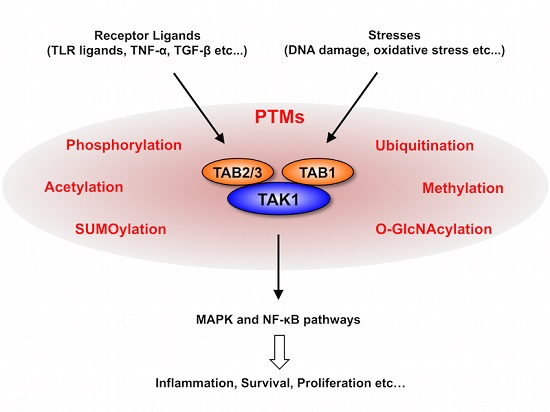TAK1 is an enzyme and signaling molecule in humans encoded by the MAP3K7 gene (a mitogen-activated protein). TAK1 regulates cellular death through various pathways. As we have discussed before, programmed cell death is a normal, physiologic process intended to help remove damaged cells. However, unattended cell death is the direct pathway for human disease. TAK1 contains binding proteins that are responsible for cell viability and tissue balance in a variety of organs.
TAK1 is a key molecular component that can readily determine of the fate of our body’s cells. TAK1 has been typically considered pro-survival, however, recent studies have determined that various factors could cause it to induce cell death. Scientifically speaking, studies are exploring the ability to inhibit TAK1 as a therapeutic approach to killing off rogue cancer cells and stopping chronic inflammatory response.
Researchers at Washington State University Health Sciences Spokane and others have recently conducted studies involving the treatment of Gout by suppressing the inflammation via the inhibition of TAK1. Uric acid crystals that are formed and accumulate in the joints are perceived as an attack on the human body and naturally triggers an immune system response. The cytokine protein, IL-1-beta, is released to help “fight off the attack” and the inflammation ensues as a result.
“It’s kind of a vicious cycle that starts with these crystals, which cause IL-1-beta to be produced, inducing inflammation and activating a lot of other proteins to produce more inflammation,” said Salah-Uddin Ahmed, a professor of pharmaceutical sciences in the WSU College of Pharmacy and Pharmaceutical Sciences and senior author on the study.
One of the proteins that are activated by IL-1-beta is TAK1. The research team found that uric acid crystals could directly activate TAK1 and other proteins once thought to be dependent on IL-1-beta signaling for activation.
“We already knew that MSU crystals activate what is known as the inflammasome pathway, which produces IL-1-beta,” Ahmed said. “However, our study found that MSU crystals also use an alternate pathway that triggers inflammation through TAK1, which is a new finding related to how gout develops.”
Other diseases that involve IL-1-beta mediated inflammation include multiple sclerosis, inflammatory bowel disease, and type 1 diabetes. These discoveries are naturally pushing clinical trials for TAK1-inhibitors to the forefront.
Given we are here to present options from a safe and all-natural perspective, we investigated herbal sources as a means towards putting this theory to the test. What are some natural TAK1 inhibitors you might ask? Let us take a closer look at two already existing heroes, Curcumin (Turmeric) and Resveratrol (grape seed extract).
Resveratrol plays a key role in the protection of our DNA. It is a potent antioxidant, anti-inflammatory, anti-infective extract. Resveratrol has been shown to weaken the MSU crystal induced inflammatory response by inhibiting TAK1 activity.
Curcumin is the biologically active component of Turmeric, and easily one of our absolute favorite herbs to recommend. This powerhouse checks so many boxes of benefits and it would be a disgrace for it to not be considered in all anti-inflammatory formulas. Its only downfall is its inability to remain active in the human body long enough to fulfill in standard form. Luckily, we have also found a way around that issue! Click here to find out more about bio-enhanced Curcumin, BCM-95®. </font>
